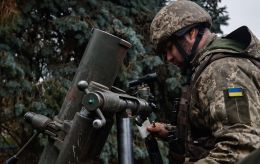Artificial intelligence changes rules on battlefield
 Artificial intelligence is changing the rules on the battlefield (photo: GettyImages)
Artificial intelligence is changing the rules on the battlefield (photo: GettyImages)
Military organizations believe that the human factor should be a key element in operations involving artificial intelligence, according to FoxNews.
Artificial intelligence is such a powerful technology that the Pentagon is investing significant funds in its development. The U.S. Department of Defense is working on approximately 800 projects related to AI to enhance the efficiency of its operations and gain an advantage over adversaries.
Germany's development in the field of artificial intelligence has impressed weapon testers worldwide. Berlin has introduced a virtual reality environment for weapons testing, allowing faster and more extensive weapon trials than ever before.
The developers of the GhostPlay project from the company 21 Strategies claim that simulating complex military battle scenarios enables the development of new and more effective courses of action.
According to the CEO of 21strategies, Ivonna Hofstetter, the simulations allow decision-making that is more human-like based on modeled military units.
In June 2023, Australia, the United Kingdom, and the United States conducted joint military exercises deploying a swarm of AI-controlled unmanned aerial vehicles (UAVs). The UAVs identified and tracked military targets in a simulated real-world combat scenario.
The U.S. Department of Defense announced plans to create a fleet of AI-controlled UAVs to be deployed on land, sea, and air, providing the U.S. with a military advantage in its confrontation with China, which is also actively developing autonomous UAVs.
Testing was conducted in southwest England on three military systems: the Challenger 2 tank, Warrior armored vehicle, and the unmanned ground vehicle Viking. The testing, carried out by the UK Defence Science and Technology Laboratory (DSTL), demonstrated effective interoperability among these systems. This means that allies can reduce duplication efforts and enhance the efficiency of their military operations.

